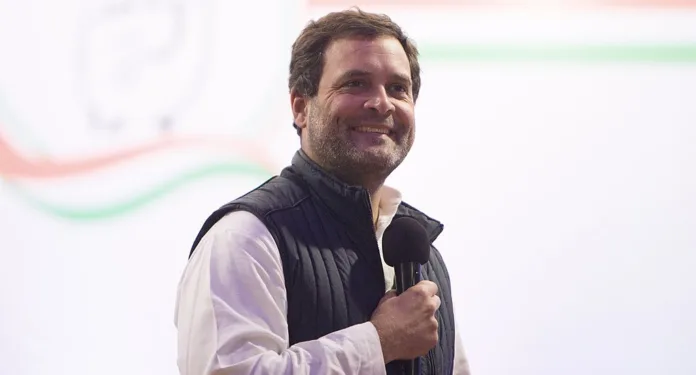At a Lucknow conclave, Rahul Gandhi casts PM Modi as a monarchist figure, asserting his disconnect with constitutional values
In a scathing critique at a conclave dedicated to the Indian Constitution in Lucknow, former Congress president Rahul Gandhi took aim at Prime Minister Narendra Modi’s style of governance. Gandhi portrayed Modi as a monarch, disconnected from the democratic and parliamentary roots of India. “Modi-ji is a king, not a prime minister,” Gandhi stated emphatically, suggesting that Modi prioritizes the interests of a select few financiers over the country’s constitutional mandates.
Rahul Gandhi, addressing a crowd filled with supporters and critics alike, challenged Prime Minister Modi to a debate, expressing scepticism about Modi’s willingness to engage. He boldly predicted that the BJP would secure less than 180 seats in the upcoming Lok Sabha elections, indicating a significant setback for Modi’s leadership in the national government.
Embed from Getty ImagesAnalysis
Rahul Gandhi’s statements are a strategic component of the Congress Party’s campaign to reframe the political narrative around governance and representation ahead of the Lok Sabha elections. His comments reflect a broader attempt to galvanize opposition among varied voter groups who may feel alienated by current policies.
Political Perspective
Gandhi’s depiction of Modi as a “21st-century king” taps into historical discomfort in India with autocratic rule and centralization of power. This analogy is designed to resonate with those who fear a dilution of democratic checks and balances in India. By casting Modi in this light, Gandhi aims to bolster his and Congress’s appeal to democratic ideals, contrasting sharply with the BJP’s alleged autocratic tendencies.
Sociological Angle
The focus on inclusivity and representation in Gandhi’s speech underscores a sociological tactic to unite diverse, often marginalized groups under the Congress banner. By advocating for a caste-based census and more equitable representation, Gandhi is addressing systemic disparities that affect a large segment of India’s population. This approach seeks to build a coalition based on shared grievances and aspirations for fairness.
Economic Implications
Gandhi’s criticism of Modi’s privatization efforts and hints at revisiting these decisions should Congress come to power speak to significant economic implications. This stance could appeal to voters who are wary of the impact of privatization on public services and national assets, suggesting a potential shift back towards more state control or regulatory oversight under a Congress-led government.
Local Impact
The speech in Lucknow, a key city in the politically pivotal state of Uttar Pradesh, is strategically important. Uttar Pradesh’s substantial electoral weight means that narratives set here resonate across the country. Gandhi’s remarks may influence local and national discourse, particularly among voters concerned about governance and democratic integrity.
Gender and Minority Considerations
Rahul Gandhi’s emphasis on inclusivity extends to addressing gender and minority issues within the broader political and social context. His advocacy for more substantial representation across all sectors, including those traditionally dominated by upper castes and males, signals a progressive stance aimed at appealing to a broad base of disenfranchised groups.
